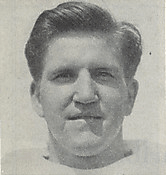Alex Kapter
Alexander Joe Kapter (March 26, 1922 – July 26, 2005) was a professional American football guard who played one season for the Cleveland Browns in the All-America Football Conference (AAFC). Kapter attended Northwestern University and joined the Browns after a stint in the U.S. Navy during World War II. Cleveland won the AAFC championship in 1946, his only season as a professional football player.
 Kapter in 1946 | |||||
| No. 39 | |||||
|---|---|---|---|---|---|
| Position: | Guard | ||||
| Personal information | |||||
| Born: | March 26, 1922 Waukegan, Illinois | ||||
| Died: | July 25, 2005 (aged 83) Thousand Oaks, California | ||||
| Height: | 6 ft 0 in (1.83 m) | ||||
| Weight: | 205 lb (93 kg) | ||||
| Career information | |||||
| College: | Northwestern University | ||||
| NFL Draft: | 1944 / Round: 21 / Pick: 211 | ||||
| Career history | |||||
| |||||
| Career highlights and awards | |||||
| Career NFL statistics as of 1946 | |||||
| |||||
| Player stats at PFR | |||||
College career
Kapter attended Northwestern University, where he played on the Northwestern Wildcats football team. He started play as a sophomore year in 1941, but only became the team's regular left guard in 1942.[1] Kapter entered the U.S. Navy in 1943, but was allowed to stay at Northwestern along with the football team's quarterback, Otto Graham, to finish the season. Kapter played in the College All-Star Game in 1943 and was named to the team again in 1944.[3] The Navy barred him from participating in the 1944 game, however, because of a rule that disallowed any activity that would require an absence of 48 hours or more.[4]
Professional career
Kapter was drafted in 1944 by the Detroit Lions, but military service delayed his entry into the professional ranks. He signed in 1946 to play for the Cleveland Browns, a team under formation in the new All-America Football Conference.[5] Otto Graham, Kapter's teammate at Northwestern, also signed with the Browns.[6] During the 1946 season, Kapter alternated on occasion with Bill Willis at right guard when Willis came down with strep throat.[7] The Browns won the AAFC championship that year.[8]
References
- "Over-Eagerness Wins Steady Job". The Leader-Post. October 14, 1942. p. 17. Retrieved August 4, 2012.
- "Complete List of Star Team". The Milwaukee Journal. Associated Press. August 10, 1944. p. 2. Retrieved August 4, 2012.
- "Seven All-Stars Banned by Order". St. Petersburg Times. Associated Press. August 16, 1944. p. 6. Retrieved August 4, 2012.
- "Ex-Marquette Guard Signed by Browns". Cleveland Plain Dealer. March 3, 1946. p. 2C.
- Piascik 2007, p. 19.
- Sauerbrei, Harold (November 4, 1946). "Field Goal in Last 18 Seconds Hands Browns 2d Loss in Row, 17-16". Cleveland Plain Dealer. p. 18.
- Piascik 2007, p. 64.
Bibliography
- Piascik, Andy (2007). The Best Show in Football: The 1946–1955 Cleveland Browns. Lanham, MD: Taylor Trade Publishing. ISBN 978-1-58979-571-6.
External links
- Career statistics and player information from Pro Football Reference